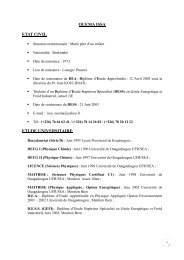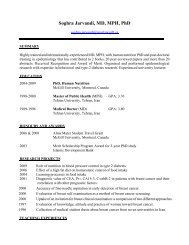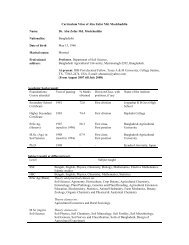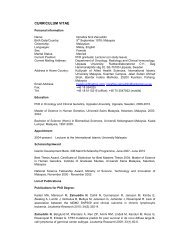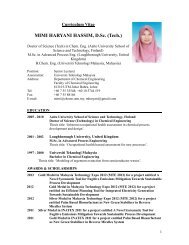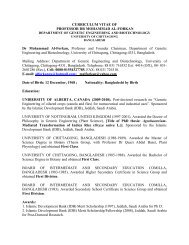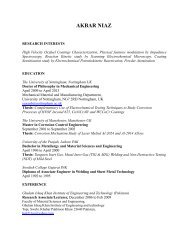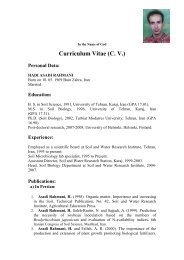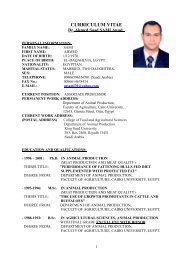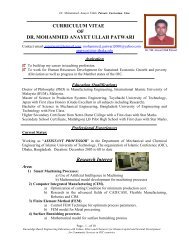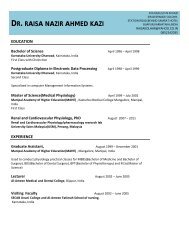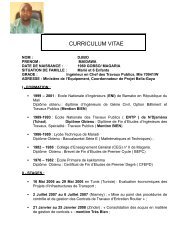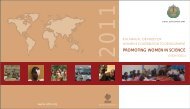Engineering: issues, challenges and opportunities for development ...
Engineering: issues, challenges and opportunities for development ...
Engineering: issues, challenges and opportunities for development ...
Create successful ePaper yourself
Turn your PDF publications into a flip-book with our unique Google optimized e-Paper software.
ENGINEERING AROUND THE WORLDdissatisfied with the academic <strong>and</strong> employability educationprovided by the technical institutions, <strong>and</strong> several strategieshave emerged to bridge the gap such as ‘finishing schools’, cocurricularexperiences <strong>and</strong> similar. Attrition rates in severalindustries are high, <strong>and</strong> talent management, which involvesstrategies <strong>for</strong> identifying, attracting, retaining <strong>and</strong> managingtalent, is important.Figure 1: R&D Expenditure by sector, 2000–2002GRI IHL Private1.000.000900.000800.000While the fruits of globalization have benefited the burgeoningmiddle class, who are able to take advantage of technologicaladvances including the Internet <strong>and</strong> mobile phones, a largeproportion of the population remains illiterate <strong>and</strong> unable toaf<strong>for</strong>d such technologies, <strong>and</strong> is yet to experience prosperity.This has resulted in great inequalities in education, technology,in<strong>for</strong>mation <strong>and</strong> quality of life. Furthermore, India already facessevere shortages in several critical resources covering energy,water <strong>and</strong> qualified personnel. Future <strong>challenges</strong> exist in severalareas such as ensuring balanced <strong>development</strong> that benefitsas much of the population as possible, adopting a sustainable<strong>development</strong> path, ensuring access, equity <strong>and</strong> quality in allsectors of education, ensuring employment <strong>and</strong> employ ability<strong>for</strong> the population, <strong>and</strong> enhancing literacy <strong>and</strong> science <strong>and</strong>technology literacy among the population, among others.Still, world-class accomplishments have been achieved inengineering, in areas such as space science <strong>and</strong> technology,in<strong>for</strong>mation technology services, biotechnology, technologyenhancedlearning, renewable energy technologies, <strong>and</strong> soon. The use of new fuels <strong>for</strong> transportation <strong>and</strong> of renewableenergy technologies <strong>for</strong> power, cooking, heating <strong>and</strong> cooling isincreasing. And industry is coming to appreciate the imperativesof a ‘triple bottom line’. Expectations from engineering inIndia are indeed considerable.MalaysiaAzni Idris <strong>and</strong> Rohani HashimThere are significant social <strong>and</strong> economic inequalities betweendeveloped <strong>and</strong> developing countries. Many of the underlyingcauses of these differences are rooted in the long history of acountry’s <strong>development</strong> <strong>and</strong> include political, historical, social,cultural, economic <strong>and</strong> geographical factors, <strong>and</strong> also theirrelations with other countries.Expenditure (RM million)700.000600.000500.000400.000300.000200.000100.00002000 2002 2000 2002 2000 2002 2000 2002In<strong>for</strong>mation, Comp.& Comm. Tech.In developing countries, economic growth – <strong>and</strong>, more widely,human <strong>development</strong> – can be enhanced by a comprehensivescience <strong>and</strong> engineering policy. However, science <strong>and</strong> engineeringcan play their role in <strong>development</strong> only when the integrityof the whole sector ( research institutions, universities, researchpriorities <strong>and</strong> human resources involving creative scientists) ispreserved. Thus, the strategy in developing countries is one ofincreasing funding <strong>for</strong> research <strong>and</strong> <strong>development</strong>, <strong>and</strong> to setpriorities <strong>for</strong> the science <strong>and</strong> engineering sectors with short,medium <strong>and</strong> long-term plans.Many developing countries have made important contributionsto the <strong>development</strong> of science <strong>and</strong> technology. The practicalapplication of science through engineering has createdan environment <strong>for</strong> the pursuit of science <strong>and</strong> engineeringeducation in developing countries where funding scientific<strong>and</strong> engineering enterprises is widely accepted as a vital <strong>and</strong>long-term investment.<strong>Engineering</strong> research <strong>and</strong> <strong>development</strong>Applied Science &Techno<strong>Engineering</strong>SciencesField of Research <strong>and</strong> YearSource: MOSTI, 2005GRI: Government Research Institution, IHL: Institution of Higher LearningAgriculturalThese inequalities are also brought about by the importantdifferences in their scientific <strong>and</strong> technological infrastructure<strong>and</strong> their implementation of science <strong>and</strong> engineering policies.An essential prerequisite to a country’s technological <strong>development</strong>is the necessity of a good education system <strong>and</strong> effectivehuman resources in engineering (key factors that, <strong>for</strong> example,contributed significantly to Japan’s economic success after theSecond World War).Malaysia is a country that has undergone rapid changes in theway industrial <strong>and</strong> technological research is conducted, whichgive birth to a strong, developing economy. Federal fundingon research in Malaysia was RM1.2 billion (US$340 million)during 2001 to 2005. This is a ratio of about 0.69 per cent GrossExpenditure on Research <strong>and</strong> Development as a proportion ofGross Domestic Product (GERD/GDP). This is low in contrastto Malaysia’s more developed neighbours, such as Australia223



